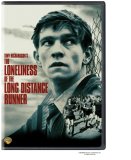| Reviews & Columns |
|
Reviews DVD TV on DVD Blu-ray 4K UHD International DVDs In Theaters Reviews by Studio Video Games Features Collector Series DVDs Easter Egg Database Interviews DVD Talk Radio Feature Articles Columns Anime Talk DVD Savant Horror DVDs The M.O.D. Squad Art House HD Talk Silent DVD
|
DVD Talk Forum |
|
|
| Resources |
|
DVD Price Search Customer Service #'s RCE Info Links |
|
Columns
|
|
|
Loneliness of the Long Distance Runner, The
Fortunately, more than enough time has passed since the 1962 release of director Tony Richardson's deeply moving The Loneliness of the Long-Distance Runner so that the frequently applied labels like "angry young man," and "kitchen sink drama," no longer really matter very much -- labels that were invented for journalistic convenience, and which the included members under those headings almost uniformly rejected anyway. The film can stand on its own now, without the need to limit it or judge it within narrowly defined genre guidelines. The anger remains in the work, of course, as does the bitterness and the overwhelming sense of futility that marks the downbeat The Loneliness of the Long-Distance Runner. But a sense of triumph for the individual, no matter how small or ultimately self-defeating it may be, is also present, and allows The Loneliness of the Long-Distance Runner to be simultaneously nihilistic and rapturous.
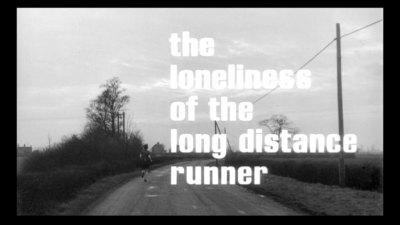
The film starts midpoint into the story of Colin Smith (Tom Courtenay), a young Northern English boy who has been sent down to Ruxton Towers, a borstal (reform school), for breaking into a bakery and stealing some office cash. Hardened by a rough life in the industrial town of Nottingham, Colin feels nothing but contempt and rage for the "establishment" that has sentenced him to this meaningless punishment. Through a series of flashbacks, we see the economic poverty of his situation, as well as his fractious home life, both forces that have obviously impacted Colin socially and personally.
The governor of Ruxton Towers (Michael Redgrave), simplistically believes that by "channeling" a boy's anger into vigorous activities such as sports, a responsible member of society may be made out of a criminal or malcontent. Therefore, sport and competition are foremost on the governor's mind, particularly the cross-country event -- a glamorous sport when compared to the more prosaic (and plebeian) football, and one that has attracted the attentions of Ranley, a public school which wishes to compete against Ruxton Towers ("public school" is the English term for a private, tuition-based school). After watching a practice run where Colin beats Stacy (Philip Martin), the school's best runner and therefore, the governor's pet charge, the governor lets Colin know that he expects him to win the upcoming cross-country race against Ranley.
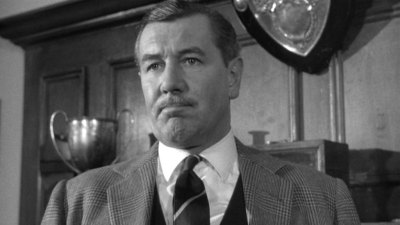
Colin, contemptuous of the governor and all he stands for, is cunning enough to lie low ("Let them think I'm housetrained") and go along with the governor's plan to train him as a cross-country runner. Finding a personal ecstasy of freedom in running (particularly when he's allowed to run alone, unescorted, along the outer reaches of the borstal's property), Colin ruminates on his homelife, remembering the death of his father from cancer, the orgy of spending that his mother and her "fancy man" (lover) committed with his father's insurance money, and his break-in at the bakery. When Stacey, humiliated by his descent from top dog at the school to just another insignificant inmate, decides to run away, he's returned to the school and severely beaten. This act, coupled with the sudden appearance of Colin's mate, Mike (James Bolam) at Ruxton Towers, throws Colin into severe doubt about his participation in the big running event. Finally, the day of the big race has come for Colin.
When The Loneliness of the Long-Distance Runner came out in 1962, it was attacked on many fronts from British film critics who were unnecessarily harsh in their evaluations. Frequently citing "New Wave" formalistic violations, the feeling among the critics at the time was that director Richardson had somehow failed to capture the power and beauty of author Alan Sillitoe's (Saturday Night and Sunday Morning) original short story (Sillitoe did write the screenplay, though, which they didn't seem to take into account). Richardson, whose previous films Look Back in Anger, The Entertainer and A Taste of Honey, were all increasing his fame and notoriety, had just gone to Hollywood, as well, to do the ill-fated Faulkner adaptation of Sanctuary. By 1962, the label "angry young man film" was already becoming a dreaded cliche with critics who were beginning to tire of the genre. All of these factors (particularly the perceived snub of "going Hollywood" when Richardson left for his big-budget U.S. film) probably didn't help The Loneliness of the Long-Distance Runner's reception with the critics. Viewed today however, The Loneliness of the Long-Distance Runner stands as Richardson's strongest work.
Richardson, utilizing many of the "New Wave" techniques (grainy black and white cinematography, staccato editing rhythms and montages, greater use of real locations, jump cuts, time frame distortion, fast motion photography), that marked a stylistic departure from the staid, square, classical form of the British film industry, perfectly captures the jumbled up emotions and the indiscriminate anger of Colin's character. Colin can find no solace in the commercialized, homogenized capitalist system he despises. His father, a socialist union member (Colin mentions that he was a strike organizer), worked himself to death for little wages, and for no apparent gain in his station. When Colin's mother offers him spending money from his father's insurance settlement, Colin takes the pound note and burns it -- happiness for Colin doesn't come from buying the inane items that are advertised on their new, blaring television, or from his father's blood money.
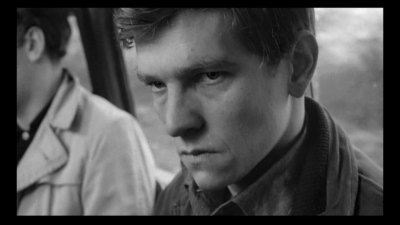
Colin can't even enjoy the money he stole from the bakery, either. An impulsive act brought on by his mother throwing him out of the house until he could financially contribute, Colin's theft doesn't even yield a momentary respite from his grinding, directionless existence. He has to hide the money until things cool down. His poor hiding place -- a rain gutter -- exposes his guilt when a police officer comes to question him during a downpour. The only joy Colin experiences in the movie is when he's alone, in the woods, running -- free from everything except his memories.
Once at Ruxton Towers, he immediately sees through the facades of the governor and Brown (Alec McCowen), the new House Master and ineffectual social worker who is totally incapable of getting through to what troubles Colin. Using a tape recorder (which immediately shuts down suspicious Colin), Brown is completely unaware that his cliched Freudian word association game will yield no clues as to Colin's motivations (a brilliant scene by Richardson, and one which, I would like to think, was copied by Aldrich in The Dirty Dozen). The governor's hail and hearty physical regime won't yield results, either -- especially since the governor, deep down, doesn't have the slightest concern for the futures of the boys he incarcerates. Obsessed with being on the same level as the tony public school that wants to play Ruxton, the governor uses the boys to further his own self image and self-worth. Ample proof of that is in the governor's treatment of Stacy. Stacy, who was the school favorite because of his athletic prowess, is immediately forgotten by the governor as soon as he's no longer useful. He hasn't been rehabilitated, or changed in any significant way; he's merely been used and discarded -- as indeed Colin will be the minute he becomes unnecessary, or refuses to play along with the game (when the boys first arrive at Ruxton, the governor gives the classic "you play ball with us, and we'll play ball with you" speech that every martinet/fascist gives in the movies).
SPOILER!
What I find most interesting about The Loneliness of the Long-Distance Runner is its refusal to be in any way sentimental about Colin's plight. There's no question that the film is a story of social and political protest, as seen through the eyes of a psychically wounded, angry young man (if you'll forgive me using that term). And we do feel sympathy for Colin. But it's a trap of his own making, as well as society's, and we're never asked to excuse his behavior, or even necessarily buy into his way of thinking. That's why his final act in the film is so emotionally satisfying. Refusing to cross the finish line when he's tens of yards ahead of the next person, while smiling at the enraged, infuriated governor, Colin has committed an act of self-destruction that will very probably cost him dearly in his subsequent treatment at the borstal. "Quitting" has always been an abhorrent, dirty word in American culture, but Colin's refusal to run, framed by the film's insistence that the establishment must be, if not changed then at least challenged, becomes a personal statement of stubborn individualism -- ironically, perhaps the most valued personal trait in American culture. He has no other way to strike a blow at his perceived oppressors, than to stop short of the finish line, and smirk at the expectant, then slowly horrified, governor. To society and the authority figures who control it (earlier, Colin stated they should all be lined up and shot -- because that's what they'd like to do to him), Colin is nothing, and British society at the time offered precious little opportunity for a person like Colin to advance. With few economic opportunities, coupled with a rigid class system that allowed little or no upward movement, Britain was clearly failing people like Colin. And he knows this; his defiant refusal to run is the only way he can express any outrage over his seemingly hopeless situation, while still showing the establishment -- the governor -- that the individual will always have the final say when it comes to their own destiny.
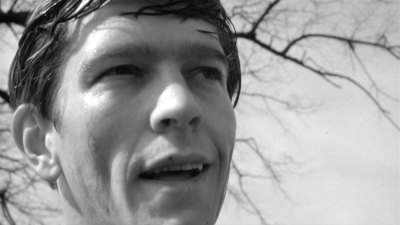
The DVD:
The Video:
The black and white, matted (1.78:1), enhanced for 16x9 TVs, widescreen video image for The Loneliness of the Long-Distance Runner looks very good here in this transfer. Blacks hold, and the print used is clean, with few if any scratches.
The Audio:
The Dolby Digital English 2.0 mono soundtrack accurately reflects the original theatrical presentation of The Loneliness of the Long-Distance Runner.
The Extras:
The original trailer for The Loneliness of the Long-Distance Runner is included on this disc.
Final Thoughts:
Gritty, harrowing, downbeat, and yet at the same time, curiously hopeful and ultimately triumphant, The Loneliness of the Long-Distance Runner is director Tony Richardson's best film, and a powerful statement on an individual's place in an indifferent, even malevolent society. I highly recommend The Loneliness of the Long-Distance Runner.
Paul Mavis is an internationally published film and television historian, a member of the Online Film Critics Society, and the author of The Espionage Filmography.


|
| Popular Reviews |
| Sponsored Links |
|
|
| Sponsored Links |
|
|
| Release List | Reviews | Shop | Newsletter | Forum | DVD Giveaways | Blu-Ray | Advertise |
|
Copyright 2024 DVDTalk.com All Rights Reserved. Legal Info, Privacy Policy, Terms of Use,
Manage Preferences,
Your Privacy Choices | |||||||









